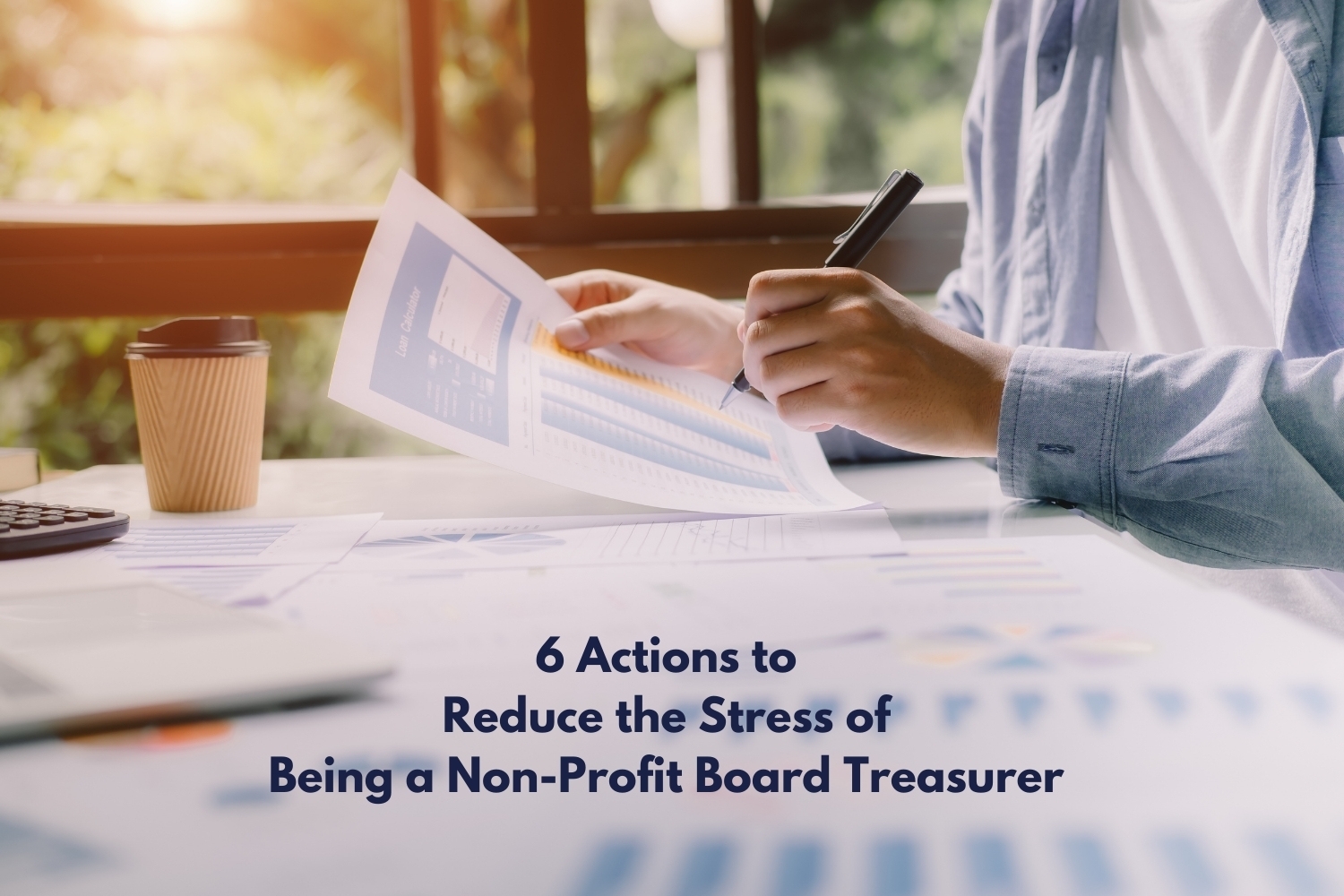6 Actions to Reduce the Stress of Being a Non-Profit Board Treasurer

Perhaps the most avoided position on a non-profit’s board of directors is that of Board Treasurer. The Board Treasurer is responsible for overseeing all aspects of a non-profit’s financial system, from policy development to internal controls, from budgets to the annual audit, or from financial statements to fraud protection.
The job holds a huge responsibility and requires an initial level of knowledge. It simply isn’t a job for someone unwilling to give it the time or respect it deserves. The time commitment and responsibility are the biggest reasons why most non-profit board members will do anything to avoid the job. That puts a non-profit in a difficult place because the position is required.
Here are 6 actions a non-profit Board Treasurer can do to reduce some of the stress of the job.
Learn, Follow, and Update Policy
A non-profit needs a robust set of financial policies and procedures. It can be a policy on what to do when receiving cash. It can be a policy on proving the legitimacy of expenses. It can be a policy on monthly reporting. It can be a policy on fraud prevention. The best place to start as a non-profit Board Treasurer is to learn the policies inside and out. Always address policies that are not being followed. Create policies when needed, and revise policies that are dated.
Get to Know the Budget
The budget is the financial plan for the operating year. A non-profit Board Treasure can save themselves a lot of headaches by thoroughly understanding the details of the budget. In a smaller non-profit, without a paid Executive Director, the Treasurer may very well be responsible for preparing the budget themselves. For fast and easy reference, make is a document that matches the operations plan. If a program or service appears in the operations plan, make sure it appears in the budget. Then never let an expense go through that isn’t a pre-approved budget item.
Don’t be afraid to delay a new program expense until approved by the board.
Put in the Time for THIS not THAT
The job of Treasure is going to take some time. Find out the time commitment from the previous Treasurer, fellow board members, or the paid Executive Director (if there is one). Then plan to give the duties of the job the time they deserve. Then say NO to taking on other tasks. That’s right, unless you are a seasoned financial pro, do NOT take on any other board duties until you have a strong foundational knowledge as Treasurer.
Ask a Lot of Questions
One of the best ways to detect fraud or general financial mismanagement is to ask a lot of questions. There is no perfect way to prevent bad stuff from happening, but seeking clarity is a great start to spotting problems. Ask questions to understand what expenses are being paid and why. If there is no paid staffer handling the bookkeeping, then encourage fellow board members to ask questions of you, the Treasurer. Never presume an invoice is real until it can be verified. Never presume someone will handle cash honestly, ask questions to be certain.
Review Bank Statements with Monthly Reports
Bank statements are the record of real-time transactions. They are a critical component of a non-profit’s financial transactions. They should always be included in monthly financial reports. If there is a paid staffer preparing monthly reports, the Treasurer should insist to see monthly bank statements, for ALL accounts. If the Treasurer is the one preparing the monthly reports, they should insist the board review the bank statements when they review the monthly reports.
Don’t Do it Alone
Yes, the Treasurer is the head of all financial matters for a non-profit, but that doesn’t mean they should do it alone. The Treasurer needs a team. Start by developing a finance committee to help with the review (and possible preparation) of monthly financial reports. Seek professional help with digital bookkeeping as needed. Find an auditor who is both willing to work collaboratively with the organization while at the same time being brave enough asking hard questions. Finally, make it know to the rest of the board that they are expected to take financial matters seriously, and that they need to read reports, and ask questions.
The Board Treasurer needs a team.
...
A Board Treasurer is a role with a huge responsibility, but it is also a fabulous opportunity to learn about non-profit financial management. This role can teach a volunteer enough to be able to list as a desirable skill on a personal resume.
A non-profit with an attentive Treasurer, supported by an equally attentive financial committee, will be in the best place possible to develop and use sound financial practices and policies.
The best way to determine if a non-profit is supporting the heavy load of a Treasurer, is to ask them. The next time the board is together, ask these questions as a discussion with the Treasurer. The answers will indicate if more support is needed or may indicate that someone new should hold the position.
- Are financial policies being followed and where are changes needed?
- Are there expenses that are being paid that do not appear in the budget?
- What other non-Treasurer duties are being handled and why?
- What questions regularly come up when reviewing financial transactions or reports?
- When is the last time bank statements were reviewed?
- What help is needed for the role of Treasurer?
When a volunteer steps up and takes on the role of non-profit Board Treasurer, they are most successful when supported by a strong team. Thanks for taking the time to read my ideas. My mission is to take the mystery out of running a small non-profit.
If you know someone working as Board Treasurer, why not grab the link, and share it with them. Let’s work together to keep stress out of volunteering.
-Christie
…
Hi, I'm Christie Saas, former board member, current Executive Director, and non-profit volunteer. I remember well, those early years when I lacked the training, the confidence, and the work-life balance to focus on becoming the best non-profit leader I could be.
Fast-forward past many bumps in the road, lessons learned, and you’ll find me still in the trenches, but a little wiser, a little calmer, and a whole lot happier. I love my work and I want to help you love yours too.
I created ChristieSaas.com to give you tools, tips, and templates to remove the mystery of learning to run a small non-profit. If you’re a brand-new non-profit leader, or a little more seasoned, someone who’s looking to make a meaningful contribution and still have time for a full life away from the job, you’re in the right place.
© Christie Saas 2022 All Rights Reserved
…
Want to learn more?
Start with one of my free resources.


